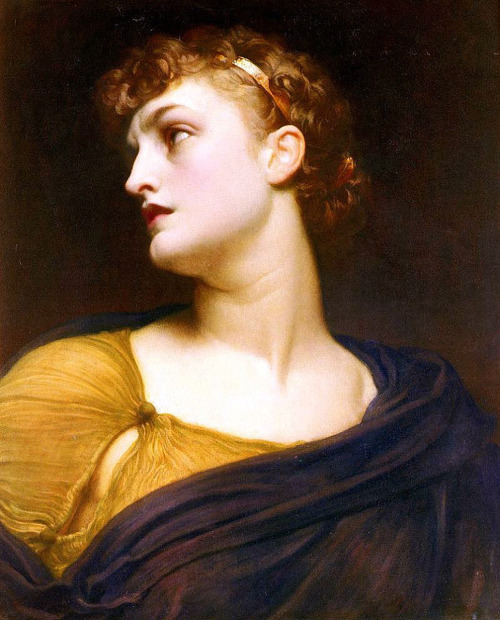#greek tragedy
The buried voice bespake Antigone.
‘O sister! couldst thou know, as thou wilt know,
The bliss above, the reverence below,
Enkindled by thy sacrifice for me;
Thou wouldst at once with holy ecstasy
Give thy warm limbs into the yearning earth.
Sleep, Sister! for Elysium’s dawning birth, -
And faith will fill thee with what is to be!
Sleep, for the Gods are watching over thee!
Thy dream will steer thee to perform their will,
As silently their influence they instil.
O Sister! in the sweetness of thy prime,
Thy hand has plucked the bitter flower of death;
But this will dower thee with Elysian breath,
That fade into a never-fading clime.
Dear to the Gods are those that do like thee
A solemn duty! for the tyranny
Of kings is feeble to the soul that dares
Defy them to fulfil its sacred cares:
And weak against a mighty will are men.
O, Torch between two brothers! in whose gleam
Our slaughtered House doth shine as one again,
Tho’ severed by the sword; now may thy dream
Kindle desire in thee for us, and thou,
Forgetting not thy lover and his vow,
Leaving no human memory forgot,
Shalt cross, not unattended, the dark stream
Which runs by thee in sleep and ripples not.
The large stars glitter thro’ the anxious night,
And the deep sky broods low to look at thee:
The air is hush’d and dark o'er land and sea,
And all is waiting for the morrow light:
So do thy kindred spirits wait for thee.
O Sister! soft as on the downward rill,
Will those first daybeams from the distant hill
Fall on the smoothness of thy placid brow,
Like this calm sweetness breathing thro’ me now:
And when the fated sounds shall wake thine eyes,
Wilt thou, confiding in the supreme will,
In all thy maiden steadfastness arise,
Firm to obey and earnest to fulfil;
Remembering the night thou didst not sleep,
And this same brooding sky beheld thee creep,
Defiant of unnatural decree,
To where I lay upon the outcast land;
Before the iron gates upon the plain;
A wretched, graveless ghost, whose wailing chill
Came to thy darkened door imploring thee;
Yearning for burial like my brother slain; -
And all was dared for love and piety!
This thought will nerve again thy virgin hand
To serve its purpose and its destiny.’
She woke, they led her forth, and all was still.
Swathed round in mist and crown’d with cloud,
O Mountain! hid from peak to base -
Caught up into the heavens and clasped
In white ethereal arms that make
Thy mystery of size sublime!
What eye or thought can measure now
Thy grand dilating loftiness!
What giant crest dispute with thee
Supremacy of air and sky!
What fabled height with thee compare!
Not those vine-terraced hills that seethe
The lava in their fiery cusps;
Nor that high-climbing robe of snow,
Whose summits touch the morning star,
And breathe the thinnest air of life;
Nor crocus-couching Ida, warm
With Hera’s latest nuptial lure;
Nor Tenedos whose dreamy eye
Still looks upon beleaguered Troy;
Nor yet Olympus crown’d with gods
Can boast a majesty like thine,
O Mountain! hid from peak to base,
And image of the awful power
With which the secret of all things,
That stoops from heaven to garment earth,
Can speak to any human soul,
When once the earthly limits lose
Their pointed heights and sharpened lines,
And measureless immensity
Is palpable to sense and sight.
Antigone by George Meredith
Post link
“Clytemnestra’s language becomes overtly erotic in 1439ff. as F admits. She describes Agamemnon as ’the soothing thing (meiligma, used in Odyssey 10,217 of bits thrown to dogs) of the Chryseids (contemptuous plural) at Troy’. Then, with no justification — Cassandra had no choice, poor girl. — she lashes out at Cassandra’s reputation calling her, in a unique phrase ‘mast-rubber’ (histotribēs: attempts to emend this word are convincingly rejected by F, DP and R).
Several editors (see F) have assumed a sexual kakemphaton here, but they have generally, like F, held that the less said about that the better: Ll-J, DP and R, find the reference to a mast unintelligible. But the fact that the terms ‘mast’ and ‘rubbing’ have clear and obvious erotic implications elsewhere in Greek literature (See G. L. Koniaris, W. B. Tyrrell, and E. K. Borthwick, in AJP 101-2 (1980, 1981), 42-4, 44-6, and 1-2: also Henderson 49, 161-4, 176 and Young as cited on 1056: to their references add the testimony of the Archbishop of Thessalonica, Eustathius 1760, 24-7).”
– Stanford, W. B., (1983:155) Greek Tragedy and the Emotions
Ahahhahahah. Prudish classics scholars totallybaffled by term literally any teenager could explain to them. What could it mean? Gosh, who knows.
also, lol at the fact that scholars have been squeamish enough about this to actually try and “emend” (read: change the text to something they like better) the text.
if i were writing a feminist myth retelling centered around a female character mostly overlooked and denied interiority in the ancient texts that mention her, i would simply not throw helen under the bus to do so
rip to margaret atwood and madeline miller but i’m different
μηδ᾽ εἰς Ἑλένην κότον ἐκτρέψῃς,
ὡς ἀνδρολέτειρ᾽, ὡς μία πολλῶν
ἀνδρῶν ψυχὰς Δαναῶν ὀλέσασ᾽
ἀξύστατον ἄλγος ἔπραξεν.don’t turn your bitterness onto Helen,
as if she were the murderer, as if she and she alone
robbed so many Greek men of their lives
and dug you a bottomless despair.Clytemnestra in Aeschylus, Agamemnon 1464-7
οὐδέ κεν Ἀργείη Ἑλένη, Διὸς ἐκγεγαυῖα,
ἀνδρὶ παρ᾽ ἀλλοδαπῷ ἐμίγη φιλότητι καὶ εὐνῇ,
εἰ ᾔδη ὅ μιν αὖτις ἀρήϊοι υἷες Ἀχαιῶν
ἀξέμεναι οἶκόνδε φίλην ἐς πατρίδ᾽ ἔμελλον.
and nor indeed would Argive Helen, born of Zeus,
have shared herself (her love and her bed) with a stranger,
if she’d known that the warlike sons of the Achaeans
would feel themselves destined to bring her back home.
Penelope in the Odyssey, 23.218-21, agreeing with this







